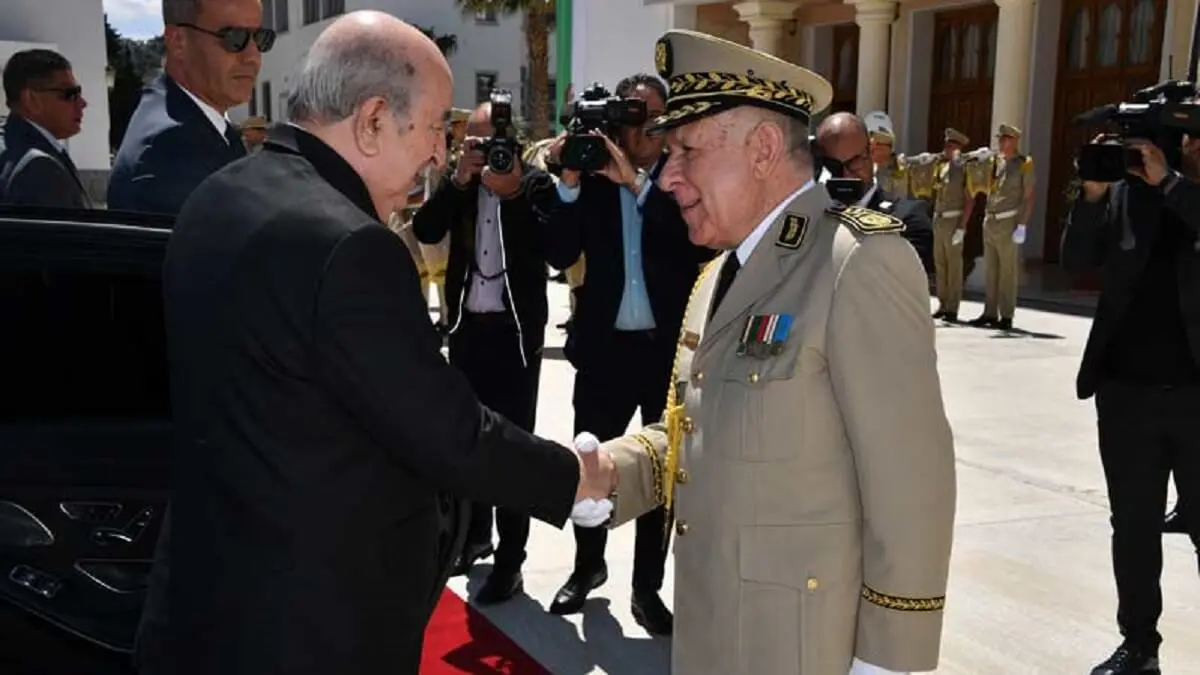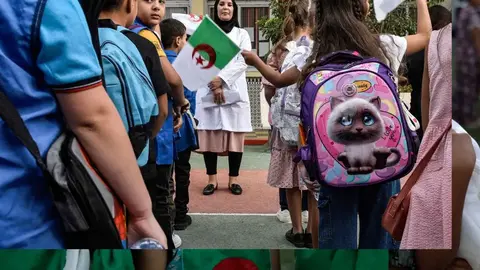Quo Vadis, Algeria?

- The founding mould: Boumédiène and the logic of amputation
- The repression of true patriots
- Chadli Ben Jedid and the ‘soldiers of France’
- The revolving door of repression
- Chengriha and Tebboune: the decline of the military system
In 1964, Mohammed Boudiaf —revolutionary, founder of the FLN and later victim of the regime he helped build— published an essay in French entitled ‘Où va l'Algérie?’ (Where is Algeria going?). In it, he already foresaw the tensions between the ideal of democracy and pluralism and the authoritarian drift that would mark the country's destiny. Today, more than half a century later, the question resonates with renewed urgency: where is Algeria headed?
This article revisits that question not out of nostalgia, but as an active critique. Through the prism of the Procrustes syndrome — a metaphor for the institutional and cultural mutilation perpetrated by the Algerian military regime — it offers a comprehensive reading and political analysis of the present. The figure of Boudiaf, his thinking and his tragic end serve here as an ethical counterpoint to the logic of uniformity and repression that persists.
In my previous article, Algeria, 63 years later, I explored how the so-called 'Oujda plot' – the military group that seized power from behind the scenes – betrayed the spirit of the Manifesto of 1 November 1954, the founding proclamation that aspired to independence within the North African framework. That dream of Maghreb integration, based on solidarity, dignity and civil governance, lies buried today under a military apparatus that has turned mediocrity into a system, repression into a method and regional confrontation into a smokescreen.
This new article offers a political and analytical reading of the Algerian regime through the Procrustes syndrome. In Greek mythology, Procrustes adjusted his guests to fit his bed: he lengthened legs or amputated bodies to make them fit. Today, Algeria is experiencing the same syndrome. The aspirations of the Manifesto — dignity, solidarity, civil government — have been violently moulded by a mediocre military caste that forces reality to fit its poor mould, even if it means mutilating the truth and the citizens.
The founding mould: Boumédiène and the logic of amputation
From the Soummam Congress in 1956, which established the primacy of political power over the military, to Boumédiène's self-proclamation as head of state in 1965, through the civil war of the 1990s and the current presidency of Tebboune, Algerian power has been a succession of authoritarian models that do not tolerate difference either within or outside their borders. Each new successor model has accentuated its mediocracy, surpassing the previous one in rigidity and exclusion.
In July 1962, after the proclamation of independence, the FLN's rear army, commanded by Boumédiène, crossed the border from Oujda (Morocco). It purged the regional leaders and maquis, with the backing of Nasser and the USSR, and imposed Ahmed Ben Bella as president. In a short time, Boumédiène accumulated the vice-presidency, the defence portfolio and the chief of staff, completely controlling the armed forces. In 1965, he staged a coup d'état, suspended the constitution and ruled by decree until 1976. When he died in December 1978, he left behind a macabre legacy: a centralised and authoritarian model in which the army was the sole guardian of a ‘revolution’ that had become an apparatus of power, where all political and trade union pluralism was banned.
The repression of true patriots
The true militants of the Revolution — maquis, intellectuals, historical leaders — were victims of persecution, imprisonment and assassination, even in exile. Karim Belkacem, signatory of the Manifesto and negotiator of the Evian Accords, was strangled by Algerian agents in Frankfurt. Mohamed Kheider was assassinated in Madrid by a secret service agent. Mohamed Boudiaf, after thirty years of exile in Morocco, was called by the generals in 1992 to chair the High State Committee. Six months later, he was assassinated live on television during a televised speech.
The poet Moufdi Zakaria, author of the national anthem ‘Kasaman’, composed his verses from prison in 1955. In 1965, he warned Ben Bella in a letter about the dangers of authoritarianism. After Boumédiène's coup, he went into exile in Tunisia, where he died in obscurity. His anthem is heard daily in the official media, but his name remains absent: a living metaphor for a regime that honours the lyrics but silences the author.
The history of the Revolution has been rewritten by those who usurped power. The official narrative tailors the facts to suit the regime, falsifying the revolutionary legitimacy. As Emmanuel Macron pointed out, the Algerian political-military system ‘has been built on the income from memory’.
Chadli Ben Jedid and the ‘soldiers of France’
Many senior figures in the Algerian military regime come from the French army, where they were promoted without academic training as part of a recruitment strategy. On the eve of independence, they ‘defected’ to join the FLN as last-minute patriots. This hard core of professional military men was key to Boumédiène's rise and the repression of his opponents.
After his death, Chadli Ben Jedid, a former French army officer, took over the presidency in 1979, surrounded by generals such as Larbi Belkheir, Khaled Nezzar and Mohamed Lamari, known as the ‘askara fransa’ (soldiers of France). Military power consolidated itself as a closed caste, where promotions depended on loyalties, not merit. Thus, when Ben Jedid attempted a timid democratic opening in 1991, he was forced to resign by General Nezar, Lamari and others. Legislative elections were suspended, and Algeria entered a decade of civil war with more than 250,000 dead.
The revolving door of repression
Since the 2000s, the Algerian military regime has evolved into an authoritarian recycling machine. Generals imprisoned for corruption or internal rivalries are released and reinstated to power, in a dynamic that reveals both the fragility and opacity of the system.
Emblematic figures such as Khaled Nezzar, former Minister of Defence, and Mohammed Mediene, alias ‘General Taufik’, head of the Intelligence and Security Directorate (DRS) between 1990 and 2015, embody the power behind the scenes. Cases such as those of Belaid Athamania and Soufiane Aouis illustrate how repression becomes a method of internal control. It is estimated that more than 40 generals and senior military officers are imprisoned by their own colleagues in a preventive purge that perpetuates fear as a tool of governance.
Chengriha and Tebboune: the decline of the military system
The current chief of staff, Saïd Chengriha — one of the octogenarians with no notable academic training — and Abdelmadjid Tebboune, a president of the Republic imposed by the military (‘yabouh el askar’ is shouted in the streets of Algiers), represent the culmination of the Procrustes syndrome: institutionalised mediocrity as a guarantee of stability.
The decadent system has created a new mould in the image of the duo and the circumstances. The same physical, intellectual and moral stature. A new Procrustes bed applied to the Algerian people, where difference is amputated and excellence is outlawed.
The alternative for Algerian citizens is clear: submit to the military mould or seek refuge beyond the borders. The mass exodus of intellectuals, journalists and citizens reflects the price of living under a regime that has transformed freedom into an alien luxury. That is why the popular cry ‘Madania, machi Haskaria’ (‘civil, not military’) resounds so strongly, an urgent call to rescue the civil ideal and restore Algeria to its own form, without mutilation.
I cannot end this article without quoting the testimony of Leïla Bencheneb, an Algerian journalist exiled in Paris:
‘When I had to cross the Mediterranean in 1994, I knew I was leaving my voice and my free thought behind. In Algiers, any different idea was cut to the size of the official mould. In exile, I understood that the only real freedom was outside those steel walls.’
The recent history of Algeria is the story of an amputated revolution, of independence confiscated by those who tailored the country to their own needs. The Procrustes syndrome is not just a metaphor: it is a power structure that mutilates truth, memory and hope.
But resistance persists. In every exiled voice, in every cry for ‘madania’, in every memory of true patriots, there lives the possibility of a free, plural and dignified Algeria. An Algeria that regains its original form, without moulds or amputations, an independent Algeria within the framework of a united Maghreb and without further disintegration. This is not only the aspiration of Algerians, but of all Maghrebians.



